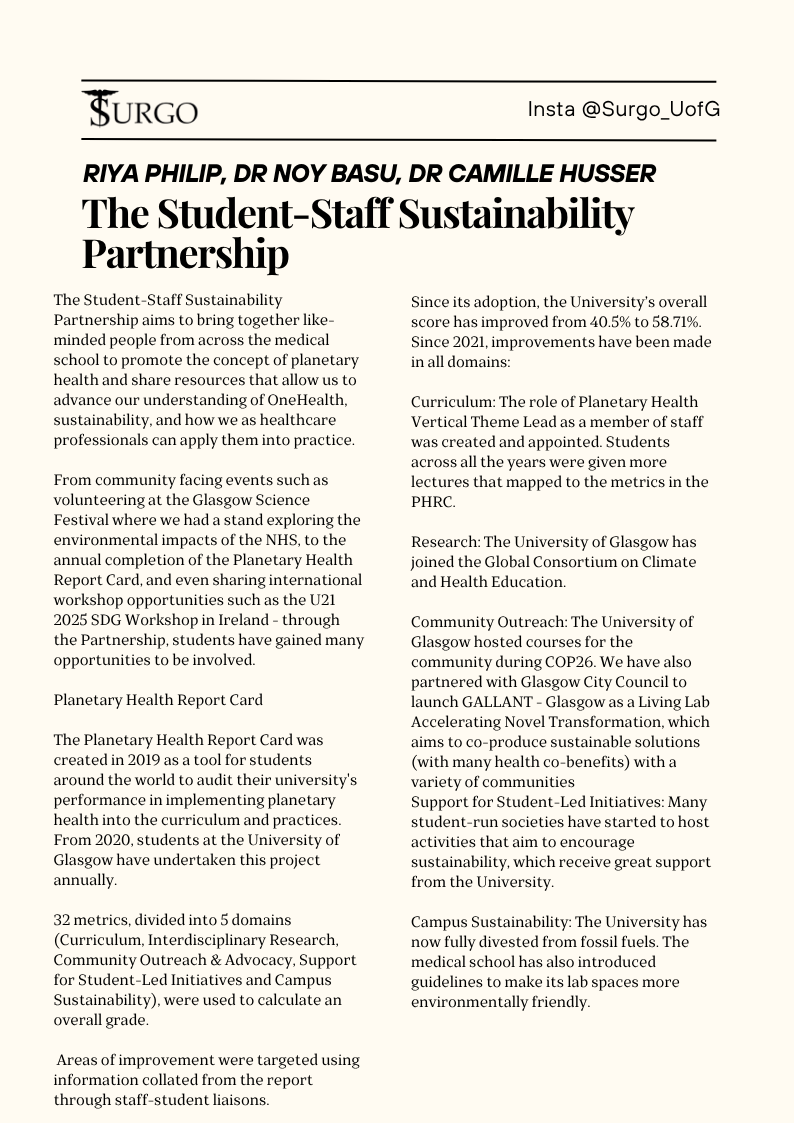The Student-Staff Sustainability Partnership
DOI:
https://doi.org/10.36399/Surgo.2.584Abstract
The Student-Staff Sustainability Partnership aims to bring together like-minded people from across the medical school to promote the concept of planetary health and share resources that allow us to advance our understanding of OneHealth, sustainability, and how we as healthcare professionals can apply them into practice.
From community facing events such as volunteering at the Glasgow Science Festival where we had a stand exploring the environmental impacts of the NHS, to the annual completion of the Planetary Health Report Card, and even sharing international workshop opportunities such as the U21 2025 SDG Workshop in Ireland - through the Partnership, students have gained many opportunities to be involved.
Planetary Health Report Card
The Planetary Health Report Card was created in 2019 as a tool for students around the world to audit their university's performance in implementing planetary health into the curriculum and practices. From 2020, students at the University of Glasgow have undertaken this project annually.
32 metrics, divided into 5 domains (Curriculum, Interdisciplinary Research, Community Outreach & Advocacy, Support for Student-Led Initiatives and Campus Sustainability), were used to calculate an overall grade.
Areas of improvement were targeted using information collated from the report through staff-student liaisons.
Since its adoption, the University’s overall score has improved from 40.5% to 58.71%. Since 2021, improvements have been made in all domains:
Curriculum: The role of Planetary Health Vertical Theme Lead as a member of staff was created and appointed. Students across all the years were given more lectures that mapped to the metrics in the PHRC.
Research: The University of Glasgow has joined the Global Consortium on Climate and Health Education.
Community Outreach: The University of Glasgow hosted courses for the community during COP26. We have also partnered with Glasgow City Council to launch GALLANT - Glasgow as a Living Lab Accelerating Novel Transformation, which aims to co-produce sustainable solutions (with many health co-benefits) with a variety of communities
Support for Student-Led Initiatives: Many student-run societies have started to host activities that aim to encourage sustainability, which receive great support from the University.
Campus Sustainability: The University has now fully divested from fossil fuels. The medical school has also introduced guidelines to make its lab spaces more environmentally friendly.
It is evident that there is steady progress as scores improve year after year. This shows that faculty take on board the feedback and work towards achieving a better score. The PHRC team has also grown since 2021, showing that more students wish to be involved in sustainability efforts. While there is more work to be done, it is obvious that there is a need for continuous auditing, and the Planetary Health Report Card offers an opportunity to highlight areas for improvement.
A poster that audited the medical school’s sustainability efforts based on data from the PHRC was also presented internationally at the MS4SF Climate Health Equity Day Conference 2025 in Washington D.C.
U21 2025 SDG Workshop
The U21 2025 SDG Workshop was held at University College Dublin and participating students hailed from University College Dublin, Lund University, University of Glasgow and University of Nottingham from a variety of disciplines, including public health, medicine, biomedical science, human nutrition, agribusiness and veterinary science. From the University of Glasgow, our delegation included one student from Nursing, one from Veterinary Medicine, one from Vet Bioscience and three from Medicine. This diverse group was intentionally chosen to represent the concept of OneHealth - the overarching theme of the workshop.
The WHO states that “One Health is an integrated, unifying approach that aims to sustainably balance and optimize the health of people, animals and ecosystems. It recognizes that the health of humans, domestic and wild animals, plants, and the wider environment (including ecosystems) are closely linked and interdependent.”(1)
On Day 1, Lecturers from UCD gave talks covering a wide range of topics to illustrate how many solutions require interdisciplinary cooperation under the umbrella of OneHealth. These talks were:
- Cervical cancer elimination by Professor Patricia Fitzpatrick
- Global HIV epidemic: Achievements and Current Challenges in Treatment, Prevention and Cure by Dr Virginie Gautier
- Disability as an Issue in the University Sector - Insights from U21 Partners, by Associate Professor Deirdre O’Connor and Professor Paul Harpur
- A One Health mindset by Dr. Gerald Barry
- One Health and Sustainable Development by Professor Patrick Paul Walsh
- Biodiversity and Human Health by Associate Professor Barry McMahon
- Educating Public Health Leaders of the Future: A Global Health Perspective by Associate Professor Mary Codd
As our delegation included students from a diverse range of degrees, we each brought forth our expertise in different subject areas. This was especially useful during Day 2 of the workshop, where the students were given case studies where the concept of OneHealth needed to be considered in order to assess the problem and devise solutions.
A real-life example that was given of “Operation Cat Drop.”(2) In the 1950s, Borneo asked the World Health Organisation to help them with malaria control. The World Health Organisation sprayed dichlorodiphenyltrichloroethane (DDT) - an insecticide used to kill malaria-carrying mosquitoes. It was then noticed that the population of rats had increased and infestations were leading to diseases passed from them.
The issue was that DDT was poisonous to cats. With the native cat population declining, the population of rats increased, and so did the diseases from them.
Operation Cat Drop was planned to parachute cats into Borneo to increase the cat population there.
It was fascinating to be able to hear and understand how the concept of OneHealth applied in the real world. The workshop taught us how we had to consider the interconnectedness of the environment to public health.
References:
1. One health [Internet]. [cited 2025 Jun 20]. Available from: https://www.who.int/health-topics/one-health
2. Campbell N, Powers E, Cabrera L, Cabrera D. Cats, Rats, and Roofs: The Perils of Ignoring Relationships.


